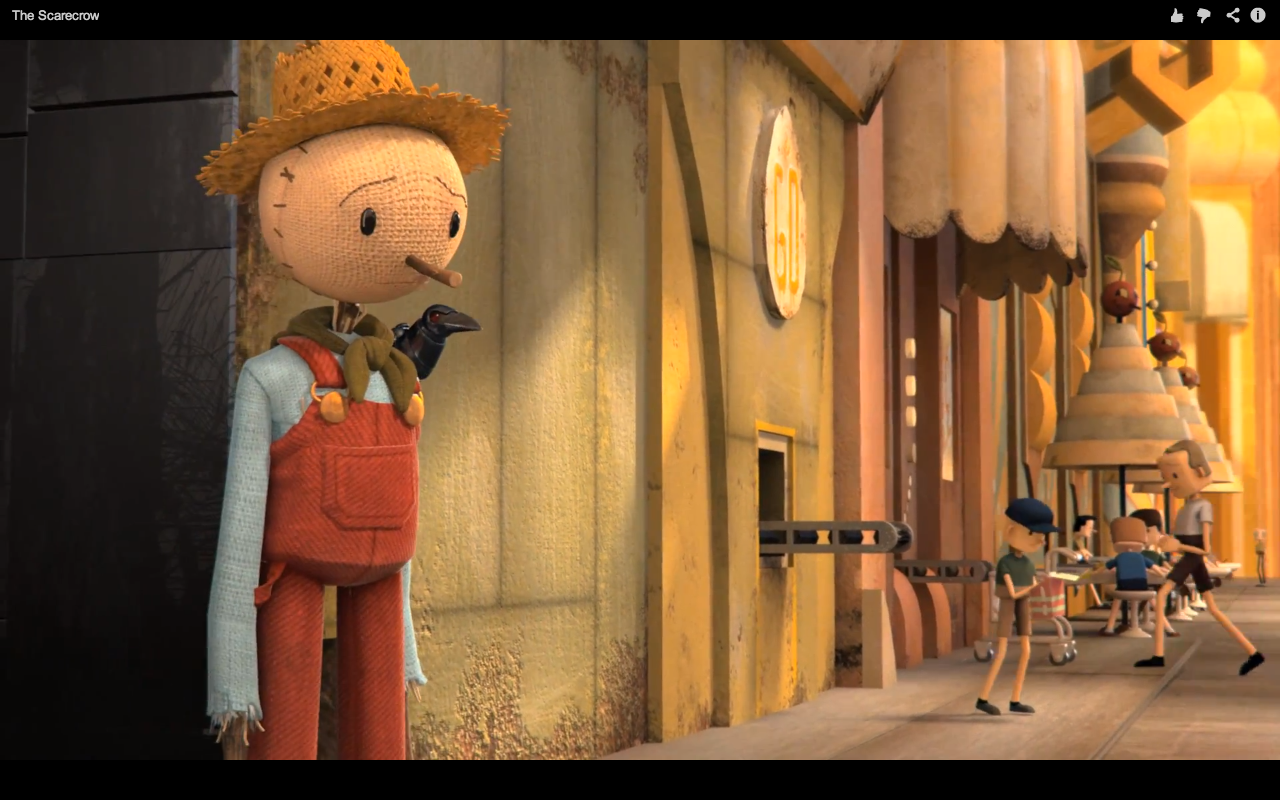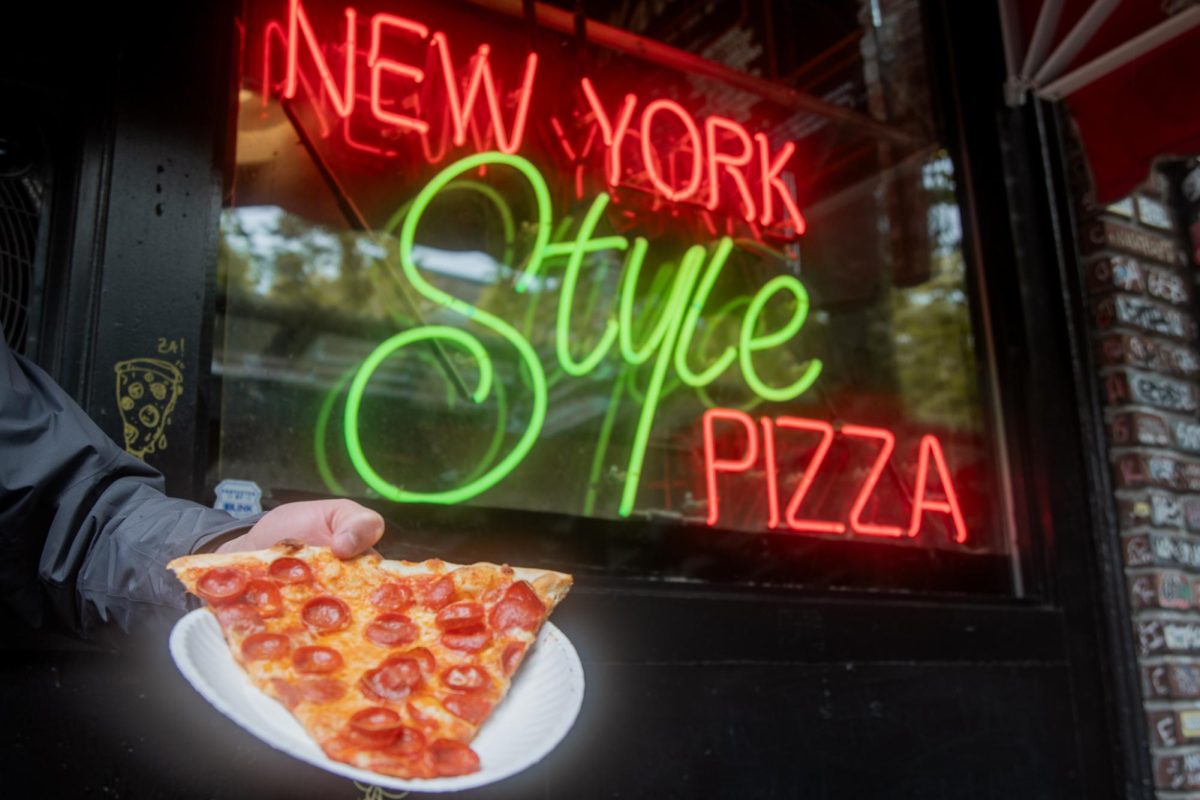
Chipotle’s “The Scarecrow” ruminates on the horrors of factory farms while innocent customers consume their protein cubes. Still shot of “The Scarecrow” via YouTube.
I have to admit: back in 2011, when Chipotle released it’s first animated advertisement featuring a sad, cylindrical farmer getting back to his roots while Willy Nelson crooned a cover of Coldplay’s ‘The Scientist”, I was smitten. The music was good, the message was inspiring, and the animation was clean and clever. Anyways, who doesn’t like a big food corporation jumping on the sustainable agriculture train?
Well, many farmers in the U.S. weren’t so excited by the outright vilification of their industry, and they’re even less impressed with the company’s newest endeavor, ‘The Scarecrow.’
The new video, which runs just over three minutes and has already garnered six million views on YouTube, follows a day in the life of a morally shaken scarecrow working for a dystopian food conglomerate by the name of Crow Foods Incorporated.
Fiona Apple sings a dark and melodious cover of Willy Wonka’s ‘Pure Imagination’ as the scarecrow goes through his day, repairing boards that cover the factories more heinous production practices: food is stuffed out of tubes in eerie cube-shaped containers, cows are imprisoned in vibrating steel boxes and innocent chickens are injected with a nondescript green ooze that makes them swell to the size of melons.
By the end of the ad, the scarecrow has returned to his homely farm outside the city and, after picking a fresh pepper (the only reminder in the course of the video that the short is an advertisement for a restaurant chain) decides to start his own fresh-produce stand in the city.
The video has been lauded—rightly so—for the incredible animation created by award-winning Moonbot studios and Fiona Apple’s cover is similarly inspiring. Moreover, many have been impressed yet again by the company’s attempts to market for food sustainability and ethical farming practices. Even Michal Pollan, the prophet of most yuppy foodies reforming their dietary habits in the U.S., has given a light endorsement of the company.
Others, however, see the ad as a very shrewd bit of corporate propaganda that appeals to many millennia’s blurry—and often inaccurate—perceptions of factory farming in order to push their own product.
Considering that Chipotle itself is a massive, publicly traded company, the criticism is not entirely unwarranted. Despite the fact that the add ends with what seems to be an endorsement of local farms, one would be hard pressed to compare Chipotle’s nearly 1500 hundred restaurants around the world to the Scarecrow’s small (and notably meatless) food stand.
The criticisms aren’t foolproof, however. Compared to many other food providers, Chipotle has a better record than most. According to a recent article in The New Yorker, Chipotle buys its pork from Niman ranch, whose pigs are antibiotic-free. The company also only buys antibiotic-free chickens and is considering moving to grass-fed only cows. The article also notes, however, that most of Chipotle’s practices are self-regulated, meaning that there isn’t a third party checking to ensure that their products are as sustainably or ethically produced as they say they are.
Many farmers also note that, despite Chipotle publically stating that the video was meant to educate consumers, the short doesn’t do much more than present a very imaginative, but simplistic, image of factory farming. There is no attempt, after all, to explain why factory farming is defended as a necessary practice—that can be regulated and done ethically—to produce enough food for a global population that is rapidly expanding and needs to be fed–or why antibiotics are harmful to livestock. It even skirts the realities of meat production—which Chipotle is certainly engaged in—by having the Scarecrow produce a vegetarian meal.
The ad is a clever attempt by a not-so-bad corporation to tug at consumers’ heart strings, and considering that most of the people who the ad is trying to appeal to, who inherently associate things like ‘factory farms’ and ‘genetically modified foods’ with visions of a green nightmare, aren’t always the most educated about the realities of farming in the U.S., it will probably be successful.
But if consumers want to avoid having their morality turned into a market strategy for a corporation with a big budget, they might just want to take the hint and stick to the farmer’s market. Or better yet, go talk to a farmer and figure it out for themselves.










